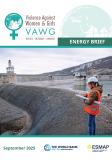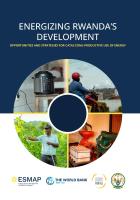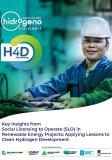Publications
Rwanda is one of the fastest-growing economies in Africa, reflecting the government's ambition to transition from an agriculture-based economy to one driven by industry and services. With the backing of development partners, the government is focusing on enhancing electricity services to stimulate economic growth and job creation. The World Bank's Energy Sector Management Assistance Program (ESMAP), in collaboration with Sustainable Energy for All (SEforALL), has produced a report titled Energizing Rwanda’s Development: Opportunities and Strategies for Catalyzing Productive Use of Energy. This report uses extensive primary and secondary data to evaluate Rwanda's potential for productive use of energy (PUE).
Through a thorough ranking process, the study identified four promising PUE technologies for further analysis: solar water pumps, refrigerators, electric motorcycles, and electric pressure cookers. The findings highlight the existence of an emerging market and emphasize the importance of affordability in the adoption of PUE technologies. Strengthening the market will require support for suppliers' access to finance, consumers' access to affordable products, and efforts in awareness creation and capacity building, all supported by enabling policies and cross-sector coordination. These initiatives will necessitate dedicated funding, which can initiate a positive cycle of development.
World Bank. 2024. Energizing Rwanda’s Development: Opportunities and Strategies for Catalyzing Productive Use of Energy. © Washington, DC: World Bank. http://hdl.handle.net/10986/42149 License: CC BY-NC 3.0 IGO.




